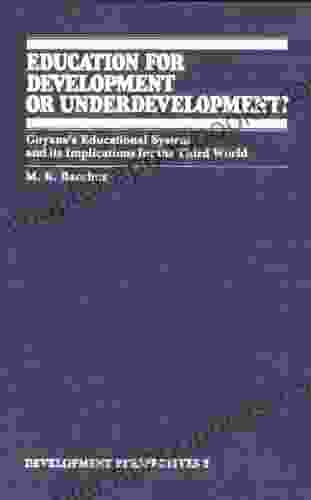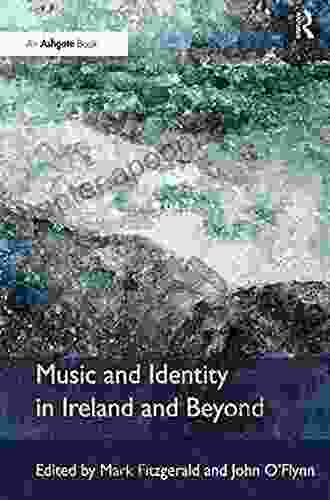Education for Development or Underdevelopment?

4.6 out of 5
| Language | : | English |
| File size | : | 1983 KB |
| Text-to-Speech | : | Enabled |
| Screen Reader | : | Supported |
| Enhanced typesetting | : | Enabled |
| Word Wise | : | Enabled |
| Print length | : | 320 pages |
| Paperback | : | 342 pages |
| Item Weight | : | 2.16 pounds |
| Dimensions | : | 8.5 x 0.78 x 11 inches |
Education is widely regarded as a key driver of development. It is seen as a way to improve people's lives, reduce poverty, and promote social justice. However, there is a growing body of evidence that suggests that education can also contribute to underdevelopment.
One of the main ways that education can contribute to underdevelopment is by creating a skills mismatch. When the education system does not provide the skills that are needed by the labor market, it can lead to unemployment and underemployment. This can result in a waste of human capital and a drain on the economy.
For example, in many developing countries, the education system is heavily focused on academic subjects, such as math, science, and history. However, the labor market in these countries is often dominated by low-skill jobs, such as manufacturing and agriculture. This mismatch between the skills that are taught in schools and the skills that are needed in the workplace can lead to high levels of unemployment among young people.
Another way that education can contribute to underdevelopment is by promoting social inequality. When the education system is not accessible to all, it can lead to a situation where the wealthy and powerful have access to better educational opportunities than the poor and marginalized. This can result in a widening gap between the rich and the poor, and can make it difficult for the poor to improve their lives.
For example, in many developing countries, the cost of education is a major barrier for the poor. This is especially true for higher education, which is often only accessible to the wealthy. As a result, the poor are less likely to have the skills and knowledge that are needed to get good jobs and improve their lives.
Furthermore, education can also contribute to underdevelopment by promoting cultural imperialism. When the education system is dominated by Western values and ideas, it can lead to a situation where the culture and traditions of the local people are marginalized. This can result in a loss of cultural identity and a sense of alienation among the people.
For example, in many developing countries, the education system is based on the model of Western education. This means that the curriculum, the teaching methods, and the assessment system are all based on Western values and ideas. As a result, the education system often does not reflect the culture and values of the local people, and this can lead to a sense of alienation and disconnection among the students.
, while education is often seen as a key driver of development, there is a growing body of evidence that suggests that it can also contribute to underdevelopment. This can occur through a variety of mechanisms, including the creation of a skills mismatch, the promotion of social inequality, and the promotion of cultural imperialism.
Therefore, it is important to be aware of the potential negative consequences of education and to take steps to mitigate these risks. This includes ensuring that the education system is relevant to the needs of the labor market, that it is accessible to all, and that it promotes cultural diversity.
By taking these steps, we can help to ensure that education is a force for development, not underdevelopment.
4.6 out of 5
| Language | : | English |
| File size | : | 1983 KB |
| Text-to-Speech | : | Enabled |
| Screen Reader | : | Supported |
| Enhanced typesetting | : | Enabled |
| Word Wise | : | Enabled |
| Print length | : | 320 pages |
| Paperback | : | 342 pages |
| Item Weight | : | 2.16 pounds |
| Dimensions | : | 8.5 x 0.78 x 11 inches |
Do you want to contribute by writing guest posts on this blog?
Please contact us and send us a resume of previous articles that you have written.
 Book
Book Novel
Novel Page
Page Chapter
Chapter Text
Text Story
Story Genre
Genre Reader
Reader Library
Library Paperback
Paperback E-book
E-book Magazine
Magazine Newspaper
Newspaper Paragraph
Paragraph Sentence
Sentence Bookmark
Bookmark Shelf
Shelf Glossary
Glossary Bibliography
Bibliography Foreword
Foreword Preface
Preface Synopsis
Synopsis Annotation
Annotation Footnote
Footnote Manuscript
Manuscript Scroll
Scroll Codex
Codex Tome
Tome Bestseller
Bestseller Classics
Classics Library card
Library card Narrative
Narrative Biography
Biography Autobiography
Autobiography Memoir
Memoir Reference
Reference Encyclopedia
Encyclopedia Linda Johansen
Linda Johansen Malini Sur
Malini Sur Marilyn Macha
Marilyn Macha Mark Fitzgerald
Mark Fitzgerald Tony Clunn
Tony Clunn Siobhan Davis
Siobhan Davis Mark Feldstein
Mark Feldstein Z M Hason
Z M Hason Wolfram Rollett
Wolfram Rollett Lynne Watterson
Lynne Watterson Susan Sallis
Susan Sallis Lulu Mayo
Lulu Mayo Martin Edwards
Martin Edwards Philip G Joyce
Philip G Joyce Paul Taylor
Paul Taylor Lorhainne Eckhart
Lorhainne Eckhart Trey Roland
Trey Roland Linda Reilly
Linda Reilly Ricardo F M
Ricardo F M Sarah Nooter
Sarah Nooter
Light bulbAdvertise smarter! Our strategic ad space ensures maximum exposure. Reserve your spot today!

 Vincent MitchellUnveiling the Epic Saga: Saint Bartholomew's Eve - A Tale of Courage and...
Vincent MitchellUnveiling the Epic Saga: Saint Bartholomew's Eve - A Tale of Courage and... Aleksandr PushkinFollow ·14.3k
Aleksandr PushkinFollow ·14.3k Philip BellFollow ·16.9k
Philip BellFollow ·16.9k Jonathan FranzenFollow ·6.7k
Jonathan FranzenFollow ·6.7k Finn CoxFollow ·18.6k
Finn CoxFollow ·18.6k Gilbert CoxFollow ·14.3k
Gilbert CoxFollow ·14.3k William ShakespeareFollow ·8k
William ShakespeareFollow ·8k Isaac MitchellFollow ·19.8k
Isaac MitchellFollow ·19.8k August HayesFollow ·8.4k
August HayesFollow ·8.4k

 W.H. Auden
W.H. AudenTerrorist Events Worldwide 2024: A Comprehensive Guide to...
Terrorism is a global threat that affects...

 Carson Blair
Carson BlairBeautifully Uplifting And Enchanting Novel Set In The...
Set in the beautiful West Country, this...

 Jeffrey Cox
Jeffrey CoxAn Utterly Captivating and Uplifting Story of One Woman's...
Immerse yourself in an extraordinary...

 Greg Foster
Greg FosterEngaging the Issues Through the Politics of Compassion
: The Power of...
4.6 out of 5
| Language | : | English |
| File size | : | 1983 KB |
| Text-to-Speech | : | Enabled |
| Screen Reader | : | Supported |
| Enhanced typesetting | : | Enabled |
| Word Wise | : | Enabled |
| Print length | : | 320 pages |
| Paperback | : | 342 pages |
| Item Weight | : | 2.16 pounds |
| Dimensions | : | 8.5 x 0.78 x 11 inches |












